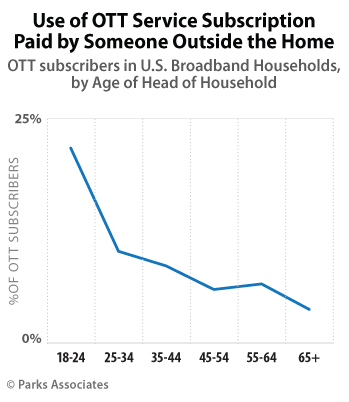OTT video password sharing to cost industry $500 million in 2015
Wednesday, July 8th, 2015
OTT video service credential sharing will cost the industry $500 million in 2015
- New report examines video piracy, credential sharing, and its impact on OTT revenue
Parks Associates announced new digital media research today that finds OTT video service credential sharing will cost the industry $500 million in direct revenues worldwide in 2015. The report The Cost of Piracy shows 6% of U.S. broadband households use an OTT video service that is paid by a person living outside of the household. It also analyzes usage and impact of live-streaming applications like Meerkat and Periscope, which are used to “share” broadcast events such as Game of Thrones episodes and the Mayweather-Pacquiao fight.

“Live-streaming usage has garnered media attention recently, but credential sharing is also a popular form of piracy in the connected world, one that has received varying responses from service providers and content owners,” said Glenn Hower, Research Analyst, Parks Associates. “Credential sharing has a measurable impact on video services, particularly in the OTT video service area, where young subscribers are active. The impact on OTT video revenues is especially troublesome as OTT providers are investing large sums of money to boost their original content offerings.”
The Cost of Piracy finds 20% of OTT users aged 18-24 use an OTT video service paid by someone outside the home, the highest of any age group. Only 10% of OTT subscribers 25-34 admit to this behavior. Previous research, reported in the whitepaper “Uprising: College Students & Changing Video Preferences,” found that few respondents expressed guilt or embarrassment over using someone else’s video service credentials.
“While credential sharing predominantly impacts OTT service revenues, the process will affect pay-TV operators in a similar fashion as they develop and deploy their own OTT and TV Everywhere offerings,” Hower said. “The motivation for credential sharing is primarily economic, and a move to consolidate video service subscriptions among family and friends stands to impact digital video services of all types in the near future.”
The report examines previous piracy incidents and the lessons learned, current piracy and content security concerns, and future piracy threats to the content industry. It includes a five-year forecast of direct revenues lost due to pirated content through credential sharing.
Latest News
- Barb to start reporting TV-set viewing of YouTube channels
- SAT FILM selects multi-DRM from CryptoGuard
- Qvest and ARABSAT to launch OTT streaming platform
- ArabyAds & LG Ad Solutions partner with TVekstra in Turkey
- Freeview NZ satellite TV service to move to Koreasat 6
- Comscore expands YouTube CTV measurement internationally
